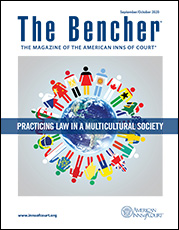What Is the Remedy for Appellate Judicial Bias?
The Bencher—September/October 2020
By Francis G.X. Pileggi, Esquire

 This short ethics column will highlight a recent decision of the Pennsylvania Supreme Court that addressed the appropriate remedy for appellate judicial bias. It will not address whether the jurist involved was appropriately described as having either apparent or actual bias, nor will it address the standard for determining actual or apparent judicial bias.
This short ethics column will highlight a recent decision of the Pennsylvania Supreme Court that addressed the appropriate remedy for appellate judicial bias. It will not address whether the jurist involved was appropriately described as having either apparent or actual bias, nor will it address the standard for determining actual or apparent judicial bias.
The decision in Commonwealth v. Koehler, 2020 Pa. LEXIS 2293 (Pa. Supr. April 24, 2020), involved an appeal that challenged post-conviction proceedings. This case was based on an allegation that a prior appellate court decision that denied appellate relief was tainted by the alleged bias of one of the jurists on the appellate panel.
Procedural History
The tortuous procedural history of this matter will not be covered in much detail. Rather, the focus of these highlights will be on the court’s analysis of what the appropriate remedy is for the participation of an allegedly biased jurist in a prior appellate proceeding. The Pennsylvania Supreme Court determined that a claim for judicial bias relates directly to the constitutional validity of a decision upholding an underlying conviction and sentence.
The appellant in this case was convicted of murder in 2006. In 2012, a former appellate judge was on a panel that denied appellate relief pursuant to a post-conviction relief statute. In 2015, the former appellate jurist was the subject of newspaper articles that quoted from emails the former judge exchanged with prosecutors. The emails were described as jokes that were merely forwarded, but they were viewed by some as being insensitive to victims of domestic violence and others. The appellant argued, based on the 2015 newspaper story, that those emails supported allegations of bias in the 2012 decision.
Constitutional Concerns
The Pennsylvania Supreme Court described a challenge to the impartiality of an appellate judge as similar to an issue challenging the effectiveness of appellate counsel and held that it “constitutionally relates directly to the validity of the decision upholding the underlying conviction and sentence. It is an attack upon the truth-determining process, a process that logically includes collateral attacks on the judgment of sentence.” Id. at * 24. Pennsylvania’s high court determined that nunc pro tunc relief is a deeply established means of remedying a breakdown in the appeal process caused by an error of constitutional magnitude. “An award of nunc pro tunc relief is intended to put the petitioner in the same position he or she was in just prior to the alleged constitutional deprivation.” Id. at * 25. The court reasoned that a new appeal will vindicate the constitutional deprivation of due process protection against a potentially biased jurist.
Court’s Reasoning for Appropriate Remedy
The court’s reasoning heavily relied on decisions of the Supreme Court of the United States granting a new appeal as an appropriate remedy for the denial of the due process right to an impartial tribunal. In a decision that also featured a Pennsylvania appellate judge, Williams v. Pennsylvania, 136 S.Ct. 1899 (2016), the Supreme Court of the United States addressed the due process rights of a litigant being violated if a biased appellate judge decided the fate of the litigant’s appeal and held that the appropriate remedy for the denial of the due process right to an impartial tribunal was a new appeal. Id. at 1909–10.
In the Koehler case, the Pennsylvania Supreme Court observed that the paramount duty of the judiciary lies with the solemn obligation to protect and uphold constitutional rights. The Rules of Professional Conduct may provide more safeguards than due process requires, and most questions of recusal are addressed by more stringent and detailed ethical rules. The Koehler court added that the same conduct may prove to be a due process violation or it may also be regulated by the Code of Judicial Conduct, but that is not a reason to ignore constitutional violations. Courts are bound to address due process claims and provide relief when those due process rights are violated even when the consequences of implementing that remedy may be awkward. Koehler, 2020 Pa. LEXIS, 2293 at * 37.
The Koehler court concluded that the proper forum to consider allegations and evidence of judicial bias was at the trial court level, and after factual and evidentiary development occurred in that forum, the appellate court could review those rulings on appeal. Thus, the matter was remanded to the trial court.
Francis G.X. Pileggi, Esquire, is the managing partner of the Delaware office of Lewis Brisbois Bisgaard & Smith LLP. He comments on legal ethics as well as corporate and commercial decisions at www.delawarelitigation.com.